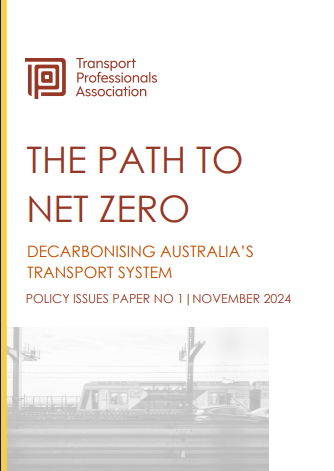The Path to Net Zero
Decarbonising Australia's transport system
Policy Issues Paper | December 2024
When we ask members and stakeholders what they see as the most important community challenges calling out for our advocacy, ‘minimising transport’s contribution to climate change’ sits near the top of people’s concerns.
They also state that better integration of land use and transport planning, and promoting active transport, are major priorities. With both of these being critical to reducing emissions generated by Australian transport projects and operations, the decarbonisation of the sector is appropriate as the subject that has been addressed by our inaugural Policy Issues Paper.
The Path to Net Zero: Decarbonising Australia’s transport system has been prepared by a working group of our members, bringing evidence to bear on recommended actions that will get Australian transport moving on its overdue journey towards achieving Net Zero.
Importantly, our recommendations address governments at all levels in Australia. They are also reflected in our own commitments as a peak body. Together, these recommendations and commitments act as a call to the nation’s transport community to take concerted action.
On that basis, we have prepared this Policy Issues Paper to:
- advocate for clear and targeted policy directions that all governments in Australia should adopt
- establish best practice for transport professionals taking a critical role in implementing Net Zero in their everyday work
- provide a pathway for us, working with other professional and industry bodies, to advocate for a fully decarbonised transport sector
- educate the broader community on the role of transport in achieving Net Zero.
We call on all members of the transport community to recognise and understand the roles that they play in decarbonising our transport systems, and to take action.
Acknowledgements
We acknowledge the contribution of the following in preparing this paper:
AITPM Decarbonisation working group
- Sebastian Davies-Slate
- Roger Green
- Benjamin Haddock
- Dr Eleanor Short
- Sara Stace
- Tim Sullivan
- Dr Shamsunnahar Yasmin
Editorial and research support
- Matt Faber
- Hannah Hartnett
- Kirsty Kelly
Find out more about our policy and advocacy platforms
And how you can get involved today to help shape the future of transport in Australia by contributing your expertise, sharing your insights, and influencing policies that drive safer, smarter, and more sustainable transport systems.


